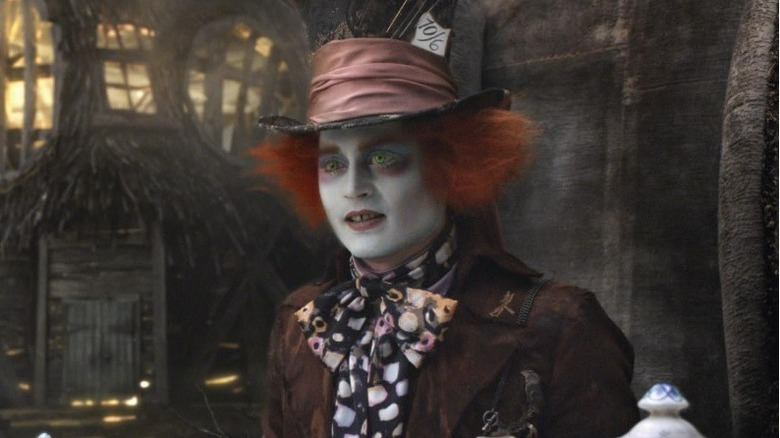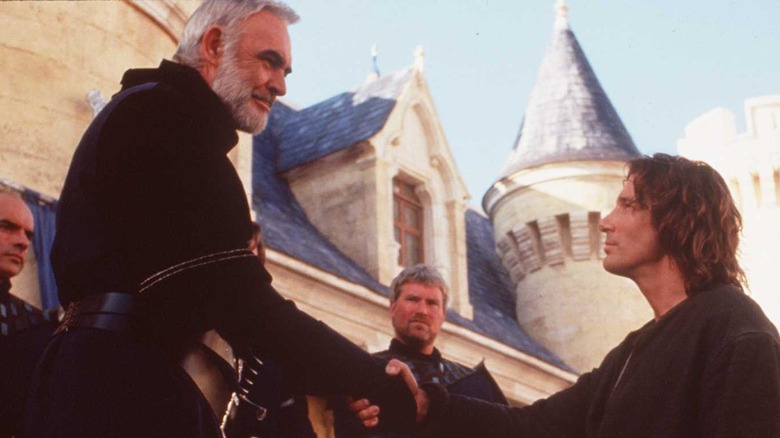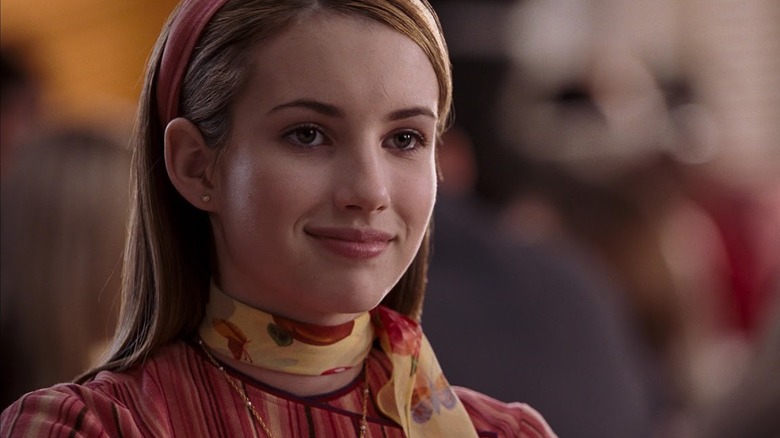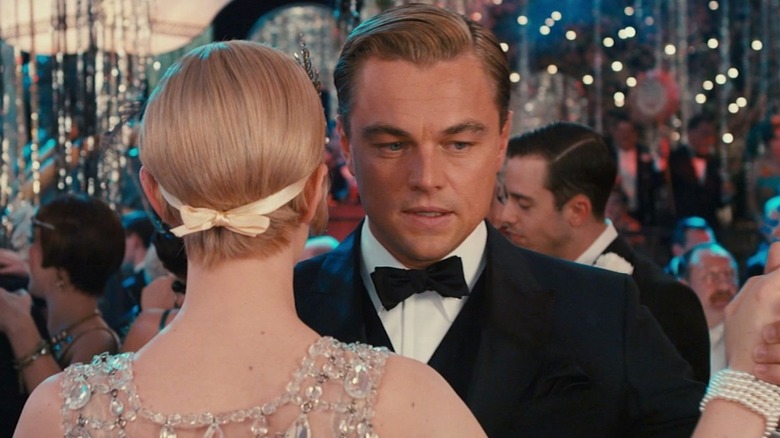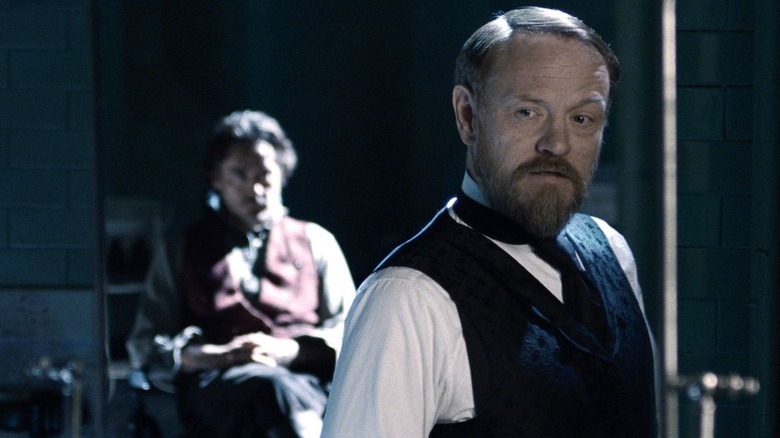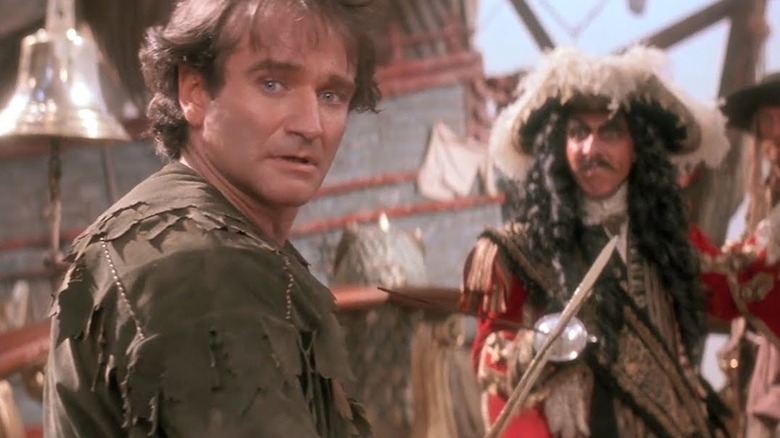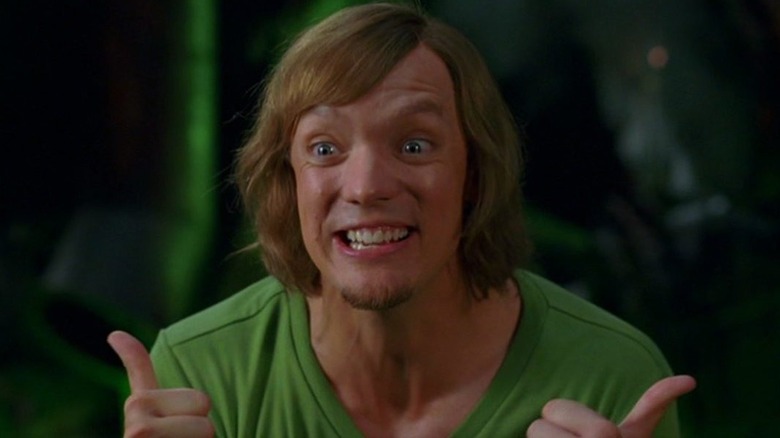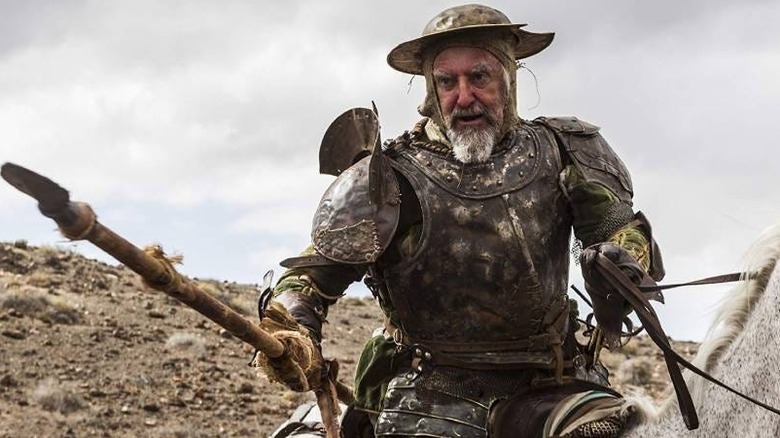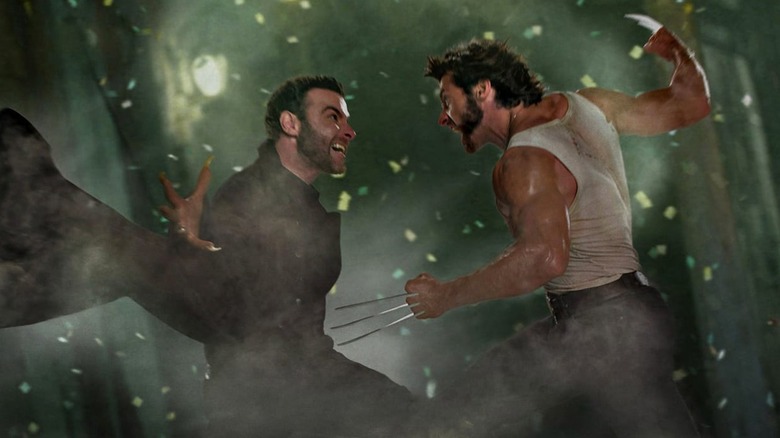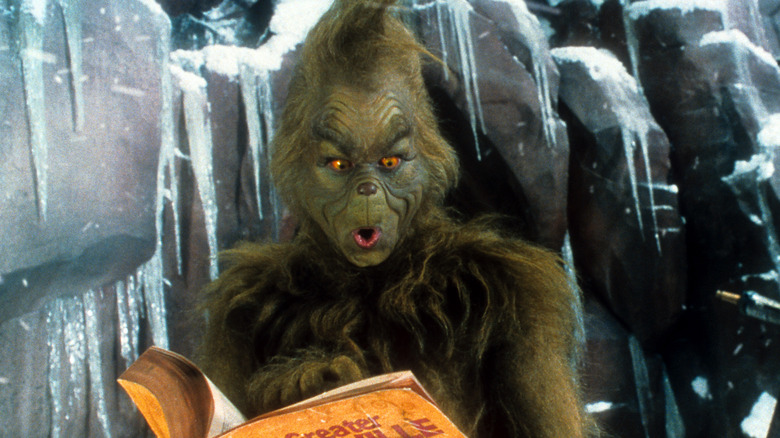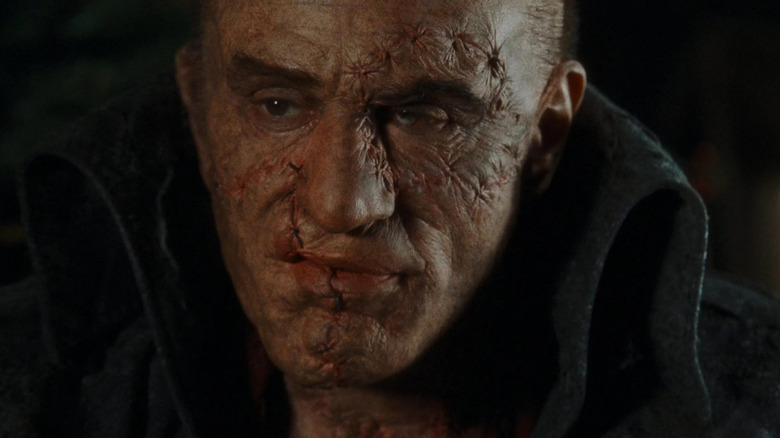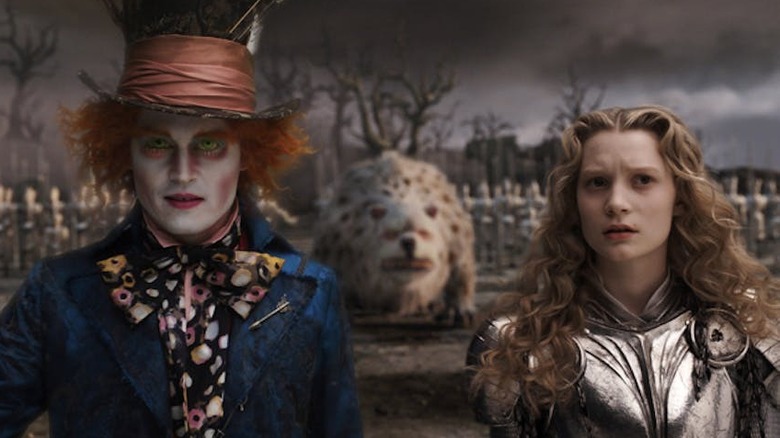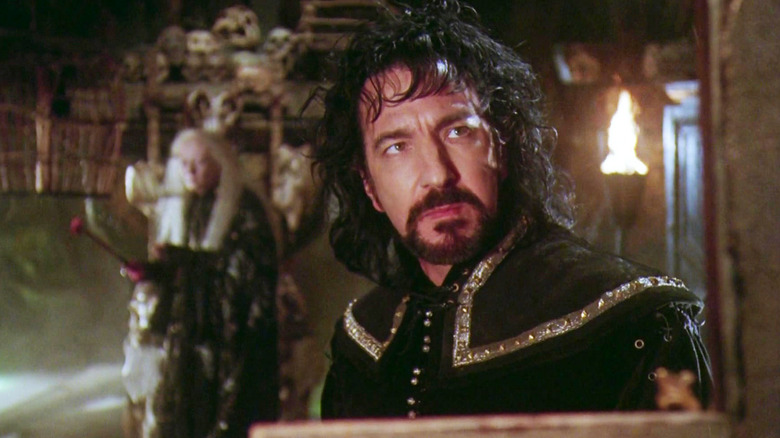Great Depictions Of Classic Characters Wasted In Disappointing Movies
There are plenty of examples of actors giving strong performances in weak movies — and, conversely, there are some otherwise-great movies that are robbed of a few quality points due to a miscast or underwhelming performance. However, there's something else that's a bit more specific, and arguably even more unfortunate: Movies where a beloved classic character is brought to life on screen in an excellent performance, but that portrayal is trapped in a film that doesn't do the character or the actor justice.
While there are examples below of characters that have been brought to life by a number of actors over the years, a few are among the all-time best screen performances of said character. But even more disappointing are the ones where the performance in question is one of the few — if not literally the only – times that the character has ever been portrayed in a live-action, non-TV movie. So the fact that those examples happen in a film that isn't befitting of the compelling way that the actor brought that character to life is really too bad.
To be fair, none of these movies are outright terrible, and all are arguably worth sitting through at least once, if for no other reason than to appreciate the performance in question. But that doesn't change the fact that these roles deserved to be showcased in much better films.
Sean Connery as King Arthur -- First Knight
Much to his chagrin, Sean Connery will forever be first known as and most commonly associated with James Bond. His acting career spanned seven decades and he only spent about a fifth of that playing 007 — and he was especially prolific between the last time he played the secret agent on film in 1983 and his retirement from acting in 2006.
Connery had long displayed an affinity for medieval-leaning roles, and he finally got the chance to play one of the most famous medieval characters of all time — King Arthur — in the 1995 film "First Knight." One of only two non-comedies directed by Jerry Zucker of "Airplane!" and "Naked Gun" fame, "First Knight" was poorly received upon its release in 1995. One of the most common complaints was that it was largely miscast, particularly Richard Gere as Lancelot.
But Connery's performance of King Arthur was widely praised and considered the best part of the movie, with Roger Ebert writing, "Sean Connery makes a splendid King Arthur." It deserved to be a more prominent feather in the actor's cap, but being lackluster as a whole didn't help "First Knight" out from under the shadow of Connery's more well-known roles.
Emma Roberts as Nancy Drew -- Nancy Drew
Before becoming one of Ryan Murphy's go-tos across multiple seasons of "American Horror Story" and "Scream Queens," Emma Roberts was already a veteran actor with screen credits going all the way back to the 2001 movie "Blow." She first broke through in the mid-2000s, playing Addie Singer on the Nickelodeon series "Unfabulous" and packing three headlining movie roles into just two years with "Spymate" (2006), "Aquamarine" (2007), and "'Nancy Drew" (2007).
With "Nancy Drew," Roberts brought to life the titular heroine of the beloved young adult book series, not seen on the big screen since a series of serials back in the 1930s. Among the critics' excerpts on Rotten Tomatoes, Kim Voynar of Cinematical gushed, "It's hard to imagine a better casting choice for the role of the spunky girl detective," but sadly, the overall consensus was that the movie was missing "excitement, surprise, and compelling secondary characters."
It was a definite star-making moment for Roberts, and she should have had the opportunity to play the role over a series of sequels — but given that her debut was a critical and commercial disappointment, her excellent take on the teenaged detective was sadly a one-and-done performance.
Leonardo DiCaprio as Jay Gatsby -- The Great Gatsby
"Romeo + Juliet," the 1995 adaptation of Shakespeare's legendary tragedy that mixed a modern setting with dialogue that was pulled nearly word-for-word from the original play, was a breakthrough for the careers of both director Baz Luhrmann and star Leonardo DiCaprio. Luhrmann and DiCaprio continued to advance their respective careers in the years that followed, but they wouldn't collaborate again until Lurhmann's 2013 adaptation of F. Scott Fitzgerald's "The Great Gatsby." While DiCaprio had been doing almost nothing but acclaimed work in the interim, Luhrmann's output hadn't been as consistent, and that was further proven with "Gatsby."
Not surprisingly, DiCaprio is wonderful in the role, even suggested as a possible career-best performance by Matt Zoller Seitz of RogerEbert.com. It's not hard to choose DiCaprio as the definitive screen version of the classic character thus far, especially with Robert Redford's underwhelming 1974 performance of Gatsby being largely deemed a disappointment.
As for Luhrmann's film, the critical consensus was a familiar one for the director, with Luhrmann's work being praised for its visual style while slammed for its lack of emotional content. In his defense, it seems to be a tough story to properly adapt, given the troubled history of such attempts, but it doesn't change the fact that it was a decent-at-best movie housing a top-of-his-game performance from its star.
Jared Harris as Professor Moriarty -- Sherlock Holmes: A Game of Shadows
Nobody was calling Guy Ritchie's gritty, stylized take on legendary detective Sherlock Holmes the best adaptation ever made. But his 2009 movie of the same name was still seen as a fun ride, aided greatly by the performances of Robert Downey Jr. in the title role and Jude Law as his assistant, Watson. It also did huge numbers at the box office, guaranteeing a sequel which followed two years later.
Though Holmes' most famous adversary, Professor James Moriarty, was only briefly heard but never seen in the first movie, he finally made his proper debut in the franchise for "Sherlock Holmes: A Game of Shadows." There have been countless actors to take on the role, but Jared Harris was an inspired choice for this particular version, as he was able to walk the perfect line between honoring the character's rich and complex literary history while also playing him as the scene-chewing action flick villain that the movie needed him to be.
While equally successful at the box office, "A Game of Shadows" was almost universally considered a step down from its predecessor, apart from raves for the performances of Harris and Downey Jr. The fate of the long-delayed third installment is still up in the air, but if Harris signs on to come back as Moriarty then we definitely hope it gets made.
Robin Williams as Peter Pan -- Hook
Those that were just the right age when "Hook" was released — or, more accurately, were just the right age when it aired on endless rotation on television — have a major soft spot for Steven Spielberg's 1991 reimagining of the Peter Pan story, which sees Peter having left Neverland, grown up, gotten married, and had children. But critics largely hated it at the time, and Spielberg's own feelings on the movie can be described as mixed at best.
That said, there's no denying that "Hook" has some great performances, even if the movie still ends up being far less than the sum of its parts. Dustin Hoffman is a wonderfully sinister Captain Hook, the always-reliable Bob Hoskins steals many of his scenes as Smee, and Julia Roberts' Tinkerbell is impossible not to fall in love with. But the genius casting of Robin Williams, as an adult slowly reconnecting with and transforming back into the adventure-loving, swashbuckling child he used to be, is what makes "Hook" a cult classic for its generation. It's hard to imagine anyone else who could have pulled it off, especially having to build a towering, to-the-rafters performance on extremely shaky material.
Matthew Lillard as Shaggy -- Scooby-Doo
Adapting classic cartoons into live-action films rarely turns into anything but an embarrassment for all involved — for every great example like "The Addams Family," there are dozens of others that seem as if they are actively trying to retroactively ruin the childhoods of those who grew up with the originals. In all fairness, there are plenty that fall somewhere in between, decent enough but ultimately forgettable and completely unnecessary. A perfect example of an entry that falls into that camp is the 2002 live-action "Scooby-Doo" movie.
Other than the fact that the CG Scooby had already aged poorly six months after the movie was released, the casting for the human characters was surprisingly solid given the available young talent at the time. Linda Cardellini as Velma was a stand-out, but the star of the show was Matthew Lillard, who was ridiculously perfect as Norville "Shaggy" Rogers in both voice and mannerisms.
In fact, Lillard did such a good job as Shaggy that he not only reprised the role for the live-action movie sequel, but also voiced the character in multiple animated series and films all the way through 2021's "Scooby-Doo, Where Are You Now!" So in this case, while his performance was initially wasted on a movie that didn't deserve it, it ended up serving as something of an audition for Lillard to become Shaggy's official voice for over 10 years.
Jonathan Pryce as Don Quixote -- The Man Who Killed Don Quixote
Few movies have seen as troubled or as long a production as Terry Gilliam's "The Man Who Killed Don Quixote" and actually still been released. In fact, there are two separate feature-length documentaries that chronicle the immense struggles of this seemingly cursed production. But the stubborn Gilliam refused to abandon his dream movie, and in 2018, he finally got it out there.
The fact that a movie that had spent over 20 years in various stages of production wasn't a complete creative failure was a miracle in itself. "The Man Who Killed Don Quixote" managed a respectable 66% on Rotten Tomatoes, making it his best-reviewed movie since 1995's "12 Monkeys." But for an epic film that Gilliam spent decades fighting to get made, the fact that it landed in "pretty good" territory still feels like a disappointment. Not to mention that, as is typical for Gilliam's more recent works, the critics who didn't like it really didn't like it.
Obviously the cast changed many times over the years, and Gilliam had to give up on his dream Don Quixote actor, Jean Rochefort, due to health issues. But Gilliam turned to his "Brazil" lead Jonathan Pryce to fill in, and Pryce delivers an astounding performance that will surely go down in history as one of the best versions of the classic Cervantes character ever seen on screen.
Liev Schreiber as Victor Creed/Sabretooth -- X-Men Origins: Wolverine
Prior to "Logan," the solo Wolverine-focused spin-offs of Fox's "X-Men" movie franchise had paled in comparison to the main series. "X-Men Origins: Wolverine" in particular was a major stain on the franchise, and remained the worst-reviewed of all the "X-Men" movies prior to the double dose of disappointment that was "New Mutants" and "Dark Phoenix." Hugh Jackman himself turned in solid performances that were wasted in those lesser films, but he got to play the adamantium-clawed anti-hero in some great movies as well.
"Origins" also saw a remarkable performance of Wolverine's most iconic villain. Liev Schreiber played Victor Creed/Sabretooth, a character whose complicated history with Wolverine has been mined for some incredible comic stories. Previously, Sabretooth's only significant screen time in the movie franchise came by way of the character's appearance in the first "X-Men" movie, played by Tyler Mane, but all he really did was growl and get into a couple of scrapes with Wolverine. Schreiber finally gave Sabretooth not only a voice but also depth, and is among the best portrayals of a villain in any Marvel movie. Here's hoping Schreiber shows up as Sabretooth along with Wolverine's return in "Deadpool 3," and that it sets the stage for him to figure prominently into the MCU's future plans for the X-Men.
Jim Carrey as the Grinch -- How the Grinch Stole Christmas
Critics mostly hated the 2000 Ron Howard-directed adaptation of "How the Grinch Stole Christmas." But considering that it did well at the box office and remains a staple of many households' annual rotation of holiday movies, it clearly has a considerable amount of fans. There is no accounting for taste, and whether or not "How the Grinch Stole Christmas" is a classic or an embarrassment is obviously up for debate.
Either way, it obviously pales in comparison to the original animated special, and it was one of only two live-action movie versions of Dr. Seuss' work that was released before his widow declared that she wouldn't allow any future live-action adaptations of his books. With all that in mind, Jim Carrey's tour de force performance in the titular role cannot be denied.
In addition to the long, grueling process he went through on each day of filming to physically transform into the character, Carrey was all-in on his portrayal of the iconic Christmas thief and never for a second seemed to just be going through the motions. It was a performance deserving of a movie that is universally hailed as an indisputable Christmas classic, not one that people despise at worst and just have on in the background while wrapping gifts at best.
Robert De Niro as Frankenstein's monster -- Mary Shelley's Frankenstein
After a couple of decades of classic literary monsters descending into camp and parody territory at the movies, there was an effort made in the '90s to make films based on classic horror novels that were more faithful to their source material. To hammer home the former point, they received titles that included the original authors' names, starting with "Bram Stoker's Dracula" in 1992 and followed by "Mary Shelley's Frankenstein" in 1994.
Directed by Kenneth Branagh, who at the time was becoming the go-to filmmaker for acclaimed screen adaptations of William Shakespeare works, his "Frankenstein" was seen as a bit of a letdown compared to his usual knack for successfully bringing stories from the page to the movie theater. In fact, both credited writers on the movie — Steph Lady and Frank Darabont — savaged the final product in the press.
All of that betrays the best part of the movie, which is casting Robert De Niro in a different spin on the creature than is typically seen on screen. He's not only more accurate to the book, he humanizes the creature in a way that no other adaptation ever did. It's one of De Niro's most overlooked and underrated performances, and needed to be in a better version of the story to fully get its due.
Johnny Depp as the Mad Hatter -- Alice in Wonderland
Though not the first Disney live-action remake of one of their animated classics, the fact that 2010's "Alice in Wonderland" soared past the billion-dollar mark at the global box office is definitely what inspired the company to make live-action remakes a major part of its portfolio going forward. Directed by longtime — though apparently now former, per his own words – Disney collaborator Tim Burton, this trip down the rabbit hole looks, sounds, and feels as if someone had entered "Tim Burton Alice in Wonderland" into an AI movie generator. That's not meant as a compliment, by the way.
After his initial string of successes, Burton's filmmaking output began to get a lot more hit or miss around the turn of the millennium, and his "Alice in Wonderland" was a miss as far as critics were concerned. It was mostly praised it for its visuals, but reviews on Rotten Tomatoes didn't hold back, calling the movie generic, joyless, and laborious to sit through.
But Burton also brought along his trusty muse Johnny Depp, who gave the movie both its funniest and most heartfelt moments in his role as the Mad Hatter. Depp's Mad Hatter might be the best version of the character ever put on screen — but when comparing entire movies to one another, this one doesn't even deserve to be at the same tea party as Disney's animated original.
Alan Rickman as the Sheriff of Nottingham -- Robin Hood: Prince of Thieves
Alan Rickman will forever be remembered for bringing some of the most iconic villains in movie history to life. His first major breakthrough was as terrorist leader Hans Gruber in the action masterpiece "Die Hard," while 2000s kids are more likely to associate him with Severus Snape in the "Harry Potter" series. In that case, he isn't actually a villain, but Rickman still had a knack for knowing how to play characters that audiences loved to hate.
There are really only two enduring things about the silly 1991 movie "Robin Hood: Prince of Thieves," starring Kevin Costner, that kept it from being completely forgotten. One is the theme song, "(Everything I Do) I Do It For You" by Bryan Adams, a massive hit at the time that remains a staple of nostalgia radio stations and wedding slow dances. The other is the delightfully unhinged performance of Alan Rickman as the Sheriff of Nottingham.
Rickman was a classically-trained actor who was capable of holding his own against the best thespians of stage and screen, but he also knew how to chew every inch of the scenery when he needed to — as he did in nearly every scene he appeared in here. In all fairness, this particular version of the Sheriff probably wouldn't have worked in a "better" Robin Hood movie — Rickman would have had to play it a lot straighter, which would have made it a lot less fun.
